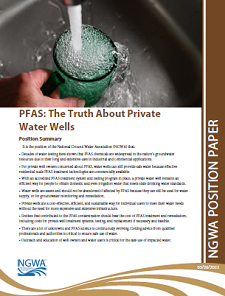NGWA will be hosting a conference on PFAS April 16-17, 2024 in Tucson, Arizona — Groundwater in the PFAS Era: Stressors, Protection, and Compliance. Click here to learn more about this event, including how you can participate by submitting an abstract.
PFAS, or per- and polyfluoroalkyl substances, is a category of human-made chemicals that have been widely used in a variety of products and industries, such as firefighting foams, protective coatings, and surfactant applications among many other uses
and products. This website section provides information on PFAS particularly oriented toward private wells and the water well industry to help you understand the sources and occurrence of PFAS in groundwater. If you are concerned about the possibility
of PFAS in your drinking water and are served by a private well, both NGWA and the U.S. Environmental Protection Agency recommend testing your drinking water as well as reaching out to your local health department for information.
As an authority on groundwater in the United States, NGWA is a leader in the science of PFAS affecting this important natural resource. Directed by a standing task group dedicated to advancing the knowledge of this emerging topic, NGWA’s PFAS initiatives
include hosting PFAS conferences focused on groundwater and publishing multiple products (technical guidance documents, white papers, fact sheets, position papers) related to PFAS, groundwater, and the water well industry.
The last several years have seen a flurry of wide-ranging legislation concerning PFAS (per- and polyfluoroalkyl substances) from Capitol Hill and state legislatures. NGWA has been a key resource on not only providing the sound science to inform policymakers
about these “forever chemicals,” but also providing solutions that our members’ expertise can provide to ensure our groundwater resources are safe and reliable. While we agree states have a right to manage and regulate PFAS based
on their unique circumstances, we also feel the federal government must provide clearer and scientifically researched guidance on PFAS treatment and disposal.
NGWA continues to advocate for:
- Supporting a bipartisan solution that creates a maximum contaminant level — or MCL — for PFOA (perfluorooctanoic acid) and PFOS (perfluorooctanesulfonic acid) based on the best available science
- Dedicating financial and technical resources to private well owners for testing and remediating PFAS
- Properly funding PFAS programs and solutions to ensure our groundwater is safe and reliable
- Advanced guidance from the EPA on the treatment and disposal of PFAS.
PFAS: Top 10 Facts
Find out important facts on this class of manmade chemicals used in firefighting, stain resistance, water repellants, and other industrial applications since the 1940s in this document created by experts. Download the PDF.
 PFAS:
The Truth About Water Wells position paper
PFAS:
The Truth About Water Wells position paper
NGWA published this position paper in 2022 that provides facts about PFAS and how water wells can still provide safe water because effective residential-scale PFAS treatment technologies are commercially available. It is ideal for sharing with local,
state, and federal officials. Download the position paper.
Practical Guide for PFAS Sampling white paper
The NGWA white paper, Practical Guide for PFAS Sampling, provides a practical guide to PFAS sample collection for those familiar with industry-standard environmental
field sampling practices.
Groundwater professionals may be called on to sample for PFAS analysis and to interpret PFAS laboratory data. The presence of PFAS in many products, potentially including products commonly used in environmental field sampling efforts, should be considered
when planning a PFAS sampling program, and this document provides a guide for such programs.
PFAS Fate and Transport 2021 white paper
NGWA’s white paper, PFAS Fate and Transport 2021, updates section four of the NGWA guidance document, Groundwater and PFAS: State of Knowledge and Practice,
which was published in 2017.
Since the release of that guidance document, many studies have investigated PFAS (per- and polyfluoroalkyl substances) transformation, partitioning, and transport; for example, the influence of PFAS accumulation at media interfaces, such as the air-water-solid
interfaces in the vadose zone.
This white paper picks up where that section of the guidance document left off by providing important updates.
 PFAS
risk communication
PFAS
risk communication
As a groundwater professional, you may need to inform a customer of the potential for PFAS contamination in their well water and subsequent actions to mitigate exposure. NGWA recently published “PFAS Risk Communication for Contractors,” a two-page fact sheet to aid groundwater professionals in such communications. The document features common questions that may be asked and talking points that may be of assistance.
The document was crafted by the following volunteers and NGWA staff:
- William M. Alley, Ph.D., NGWA
- Melissa Harclerode, Ph.D., ENV, SP, CDM Smith
- Shalene Thomas, VP, Wood Environment & Infrastructure Solution
- Andy Horn, PG, Westwater Hydrology LLC
1a8c856a29444822994ed2f71bbb8296.png?sfvrsn=e1c8cdde_0&MaxWidth=500&MaxHeight=700&ScaleUp=false&Quality=High&Method=ResizeFitToAreaArguments&Signature=01E0F4D589B1F5AD88DEBE0CDD9B7CE7FA3B16BA)
- Dave Schulenberg, QAS, NGWA.
PFAS
and private wells
NGWA recently published “PFAS and Private Well Owners: What You Need to Know,”
a two-page fact sheet that groundwater professionals can distribute to customers and others in their community concerned about PFAS. Written in easy-to-understand language by groundwater professionals, it explains what PFAS are, how to test wells
for PFAS, treatment options, and more.
NGWA
guidance document
NGWA published Groundwater and PFAS: State of Knowledge and Practice, a guidance document on PFAS in 2017. Created by 36 NGWA volunteers who spent 1100 hours on it over the
course of 12 months, it is a comprehensive eight-part piece exploring the potentially hazardous, and widely discussed, compounds in groundwater and soil. NGWA published the document to identify the known science and knowledge related to PFAS; it summarizes
the fate, transport, remediation, and treatment of PFAS, as well as current technologies, methods, and field procedures.
Water and soil guidelines and regulations
Click here to be redirected to a website where the Interstate Technology and Regulatory Council (ITRC) maintains fact sheets on PFAS along with Excel® spreadsheets that contain
PFAS water and soil regulatory and guidance values by state and federal agencies.
PFAS — Educating the Contractor and Customer (video)
Click here to access and watch the video.
NGWA PFAS experts
 Seth Kellogg, PG, a senior geologist at Geosyntec Consultants, was elected to the board of the Scientists and Engineers Section of NGWA in 2016, and the national board in 2019. She has more than 25 years of experience in evaluating
complex contaminant hydrogeology and groundwater/surface water interactions, including large groundwater and sediment sites in New York and New Jersey. As PFAS have emerged as environmental concerns, Kellogg has been working with NGWA to advance the
industry’s understanding and implementation of best practices. She has presented and published on the technical and regulatory challenges of PFAS contamination, including coauthoring NGWA’s Groundwater and PFAS: State of Knowledge and Practice (NGWA Press 2017). In May 2018, Kellogg was recommended by members of the NGWA Board of Directors to represent the Association at the U.S. Environmental Protection Agency National Leadership Summit on PFAS. Kellogg’s leadership on PFAS has also
included several presentations educating industry professionals on the fragmented PFAS regulatory framework, PFAS characterization challenges, and the complexities of PFAS fate and transport. She also served as a program adviser and facilitator for
NGWA’s PFAS in Groundwater Workshop that was held in August 2018.
Seth Kellogg, PG, a senior geologist at Geosyntec Consultants, was elected to the board of the Scientists and Engineers Section of NGWA in 2016, and the national board in 2019. She has more than 25 years of experience in evaluating
complex contaminant hydrogeology and groundwater/surface water interactions, including large groundwater and sediment sites in New York and New Jersey. As PFAS have emerged as environmental concerns, Kellogg has been working with NGWA to advance the
industry’s understanding and implementation of best practices. She has presented and published on the technical and regulatory challenges of PFAS contamination, including coauthoring NGWA’s Groundwater and PFAS: State of Knowledge and Practice (NGWA Press 2017). In May 2018, Kellogg was recommended by members of the NGWA Board of Directors to represent the Association at the U.S. Environmental Protection Agency National Leadership Summit on PFAS. Kellogg’s leadership on PFAS has also
included several presentations educating industry professionals on the fragmented PFAS regulatory framework, PFAS characterization challenges, and the complexities of PFAS fate and transport. She also served as a program adviser and facilitator for
NGWA’s PFAS in Groundwater Workshop that was held in August 2018.
 William M. Alley, Ph.D., is the NGWA director of science and technology. Previously, he served as chief, Office of Groundwater for the U.S. Geological Survey for almost two decades. Alley has published more 100 scientific publications
and coauthored with his wife, Rosemarie, High and Dry: Meeting the Challenges of the World’s Growing Dependence on Groundwater. Among other awards, Alley received the USGS Shoemaker Award for Lifetime Achievement in Communication and
the Meritorious Presidential Rank Award. He holds a B.S. in geological engineering from the Colorado School of Mines, an M.S. in hydrogeology from Stanford University, and a Ph.D. from the Johns Hopkins University.
William M. Alley, Ph.D., is the NGWA director of science and technology. Previously, he served as chief, Office of Groundwater for the U.S. Geological Survey for almost two decades. Alley has published more 100 scientific publications
and coauthored with his wife, Rosemarie, High and Dry: Meeting the Challenges of the World’s Growing Dependence on Groundwater. Among other awards, Alley received the USGS Shoemaker Award for Lifetime Achievement in Communication and
the Meritorious Presidential Rank Award. He holds a B.S. in geological engineering from the Colorado School of Mines, an M.S. in hydrogeology from Stanford University, and a Ph.D. from the Johns Hopkins University.